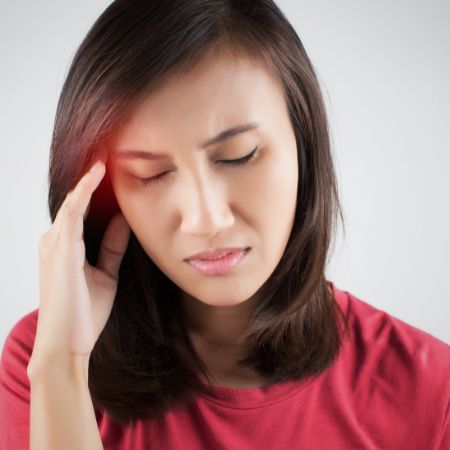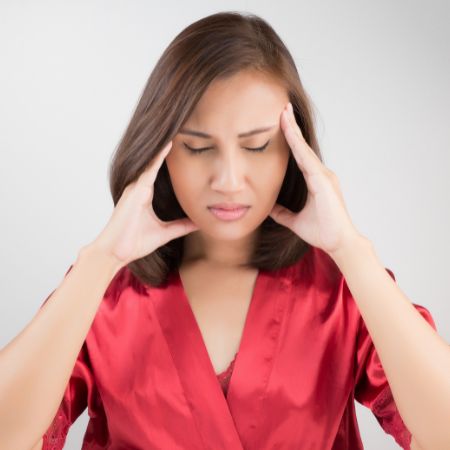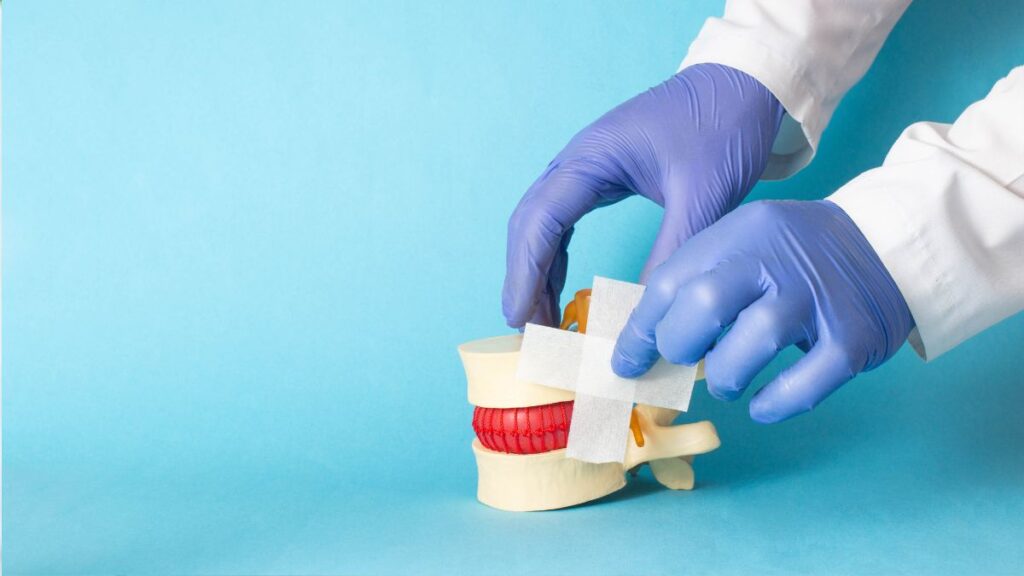Headache & Migraine Specialist Chicago, IL
Home » Conditions » Headaches
Migraine and Other Vascular Headaches—Symptoms and Diagnosis
Migraine: The most common of vascular headaches, migraines are thought to involve abnormal functioning of the brain’s blood vessels. Migraines cause severe pain on one or both sides of the head, upset stomach, and, at times, disturbed vision. People often describe migraine pain as pulsing or throbbing in one area of the head. During migraines, people become very sensitive to light and sound. They may also become nauseous and vomit. Women are more likely than men to suffer migraines.
Toxic: The second most common type of vascular headache, toxic headache, occurs during fevers from disease.
Cluster: Cluster headaches cause repeated, intense bouts of pain lasting from 15 minutes to three hours or more.

Tension and Other Muscle-Contraction Headaches—Symptoms and Diagnosis
Tension: Ninety percent of all headaches are tension headaches. They are brought on by stressful events and involve the tightening or tensing of facial and neck muscles. Pain is mild to moderate and feels like pressure is being applied to the head or neck. Tension headaches normally disappear after the period of stress is over.
Chronic: Chronic muscle-contraction headache may last for weeks or months. The pain is often described as a tight band around the head or a feeling that the head and neck are in a cast. “It feels like somebody is tightening a giant vise around my head,” says one patient. Pain is steady, and usually felt on both sides of the head. Chronic muscle-contraction headaches can cause sore scalps—even combing one’s hair can be painful.
Traction and Inflammatory: Less common than tension and migraine headaches, these headaches usually are symptomatic of other disorders, ranging from sinus infection to stroke.
Headache, Migraine, and Facial Pain Treatment in Chicago, IL
When headaches occur three or more times a month, treatment is typically recommended. Pain medication, biofeedback training, stress reduction, and elimination of certain foods from the diet are the most common methods of controlling and preventing vascular headaches. Regular exercise, including swimming or vigorous walking, can also reduce the number and severity of migraines.
Not all headaches require medical attention. But some types signal more serious disorders and call for prompt medical care. These include:

- sudden, severe headache
- sudden headache associated with a stiff neck
- headaches associated with fever, convulsions, or accompanied by confusion or loss of consciousness
- headaches following a blow to the head, or associated with pain in the eye or ear
- persistent headache in someone previously headache free
- recurring headache in children.
Where Does It Hurt?
Headaches are felt in different parts of the brain, as shown here:
- migraine (blue arrow)
- cluster headache (red arrows)
- tension type (yellow arrow)
Questions to Ask Your Doctor
- How can I reduce stress, or make other changes in my life to cut down on my headaches?
- What pain relievers should I take for a headache?
- tension type (yellow arrow)
Facial Pain Chicago
Face pain may be dull and throbbing or an intense, stabbing discomfort in one or both sides of the face or forehead.
Considerations
Pain that starts in the face may be caused by a nerve disorder, an injury, or an infection in a structure of the face. Face pain may also begin elsewhere in the body.
Sometimes face pain occurs for no known reason.

Common Causes of Face Pain
- Abscessed tooth (continuous throbbing pain on one side of the lower face aggravated by eating or touching)
- Cluster headache
- Herpes zoster (shingles) or herpes simplex (cold sores) infection
- Injury to the face
- Migraine
- Myofascial pain syndrome
- Myofascial pain syndrome Sinusitis or sinus infection (dull pain and tenderness around the eyes and cheekbones that worsens when bending forward)
- Sinusitis or sinus infection (dull pain and tenderness around the eyes and cheekbones that worsens when bending forward)
- Tic douloureux
- Temporomandibular joint dysfunction syndrome
Home Care
Follow the treatment prescribed for the cause of the pain.
Painkillers may provide temporary relief. If the pain is severe or persistent, call your primary health care provider or dentist.
What to Expect at Your Office Visit
In emergency situations (such as a possible heart attack), you will first be stabilized. Then, the health care provider will take a medical history and perform a physical examination. For tooth problems, expect a referral to a dentist or orthodontist.
You may be asked the following questions:
What part of your face is in pain?
Is the pain on both sides?
If the pain is only on one side, which side is it on?
Is the pain over a sinus (forehead, cheekbones)?
Did the pain begin suddenly?
Is face pain occurring repeatedly (is it recurrent)?
How long have the episodes of face pain lasted (for how many months)?
How long does each episode of pain last (how many seconds)?
Is the pain worse when speaking, chewing, or swallowing?
Does the pain develop when touching a specific part of the face (trigger point)?
Did face pain occur before the start of a brain or nervous system problem (weakness, speech loss)?
What other symptoms do you have?
Diagnostic tests that may be performed include:
Dental x-rays (if a tooth problem is suspected)
ECG (if heart problems are suspected)
Tonometry (if glaucoma is suspected)
X-rays of the sinuses
Neurological tests will be performed if nerve damage is suspected.




